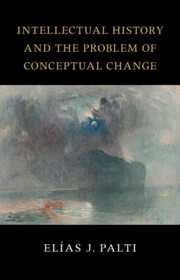Book contents
- Intellectual History and the Problem of Conceptual Change
- The Seeley Lectures
- Intellectual History and the Problem of Conceptual Change
- Copyright page
- Contents
- Preface
- Acknowledgments
- Introduction
- Chapter 1 Pocock, Skinner, and the “Historiographical Revolution”
- Chapter 2 The Republican Genealogy and the Normative Temptation
- Chapter 3 The Problem of Conceptual Change
- Chapter 4 Conceptual History
- Chapter 5 Koselleck’s Begriffsgeschichte
- Chapter 6 Hans Blumenberg and the Theory of Nonconceptuality
- Chapter 7 From Structuralism to Poststructuralism
- Chapter 8 Foucault’s Archaeology of Knowledge
- Chapter 9 The Archaeological Project and the Ignored Epistemic Mutation
- Chapter 10 Behind the Structures and the Subject
- Conclusion
- Epilogue
- Quoted Bibliography
- Index
Chapter 3 - The Problem of Conceptual Change
Published online by Cambridge University Press: 02 May 2024
- Intellectual History and the Problem of Conceptual Change
- The Seeley Lectures
- Intellectual History and the Problem of Conceptual Change
- Copyright page
- Contents
- Preface
- Acknowledgments
- Introduction
- Chapter 1 Pocock, Skinner, and the “Historiographical Revolution”
- Chapter 2 The Republican Genealogy and the Normative Temptation
- Chapter 3 The Problem of Conceptual Change
- Chapter 4 Conceptual History
- Chapter 5 Koselleck’s Begriffsgeschichte
- Chapter 6 Hans Blumenberg and the Theory of Nonconceptuality
- Chapter 7 From Structuralism to Poststructuralism
- Chapter 8 Foucault’s Archaeology of Knowledge
- Chapter 9 The Archaeological Project and the Ignored Epistemic Mutation
- Chapter 10 Behind the Structures and the Subject
- Conclusion
- Epilogue
- Quoted Bibliography
- Index
Summary
Chapter 3 goes back to Skinner’s “rhetorical turn” and the paradoxical consequences of it. As it shows, Skinner will focus exclusive on one rhetorical figure: paradiastole, which became at once an object and a heuristic tool. It is connected with his perspective of conceptual change as a form of transvaluation. This leads, in turn, to distinguish between the “reproducers of ideology” and the “innovators of ideology,” and posit the latter as the demiurges of conceptual change. At that juncture, there appears the figure of the “author.” Yet, as is shows, it is contradictory with the theoretical premises he established. At that point, we can observe the collapse of his original proposal of a “discursive contextualist” approach. Lastly, this leads his view to relapse into the dualism between “ideas” and “reality” proper to the traditional history of ideas that he intended then to counter.
- Type
- Chapter
- Information
- Publisher: Cambridge University PressPrint publication year: 2024



